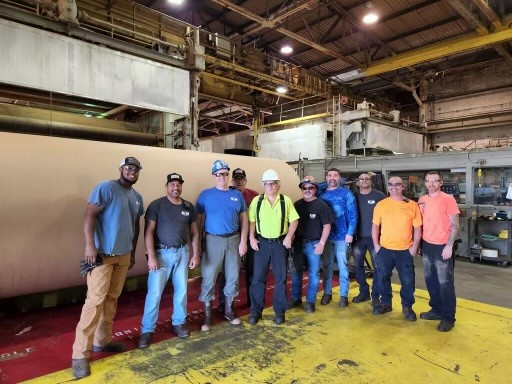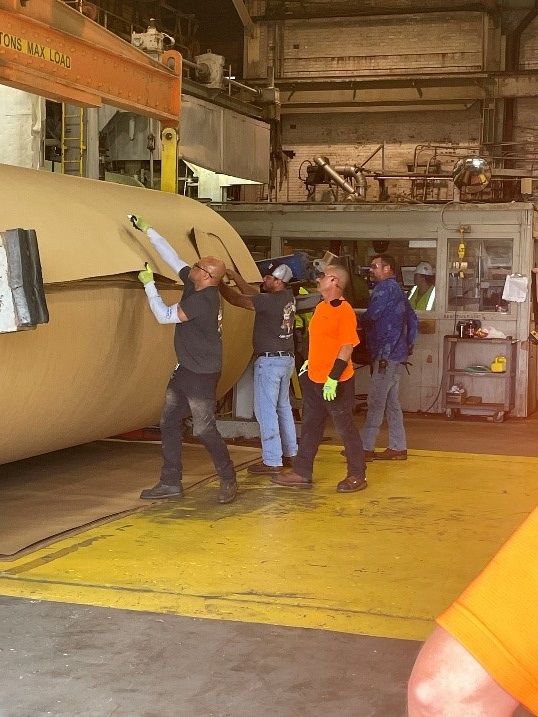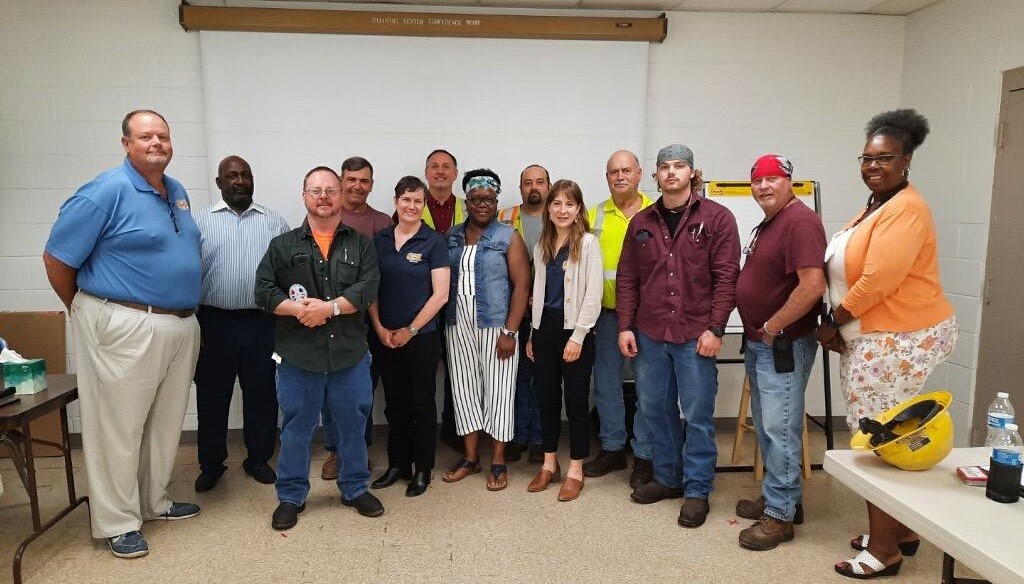Monday Morning Minute: June 6, 2022
INCIDENT ALERTS
USW Local 1915 – Green Bay Packaging – Fremont, OH
On May 3rd, a USW member was injured in the maintenance department at Green Bay Packaging’s Fremont, OH corrugated box shop. The member was near a conveyor that was loose and his hand’s middle finger was degloved and suffered a laceration after getting caught. We will report out more after USW Health Safety and Environment Staff have engaged with the Staff and Local further.
USW Local 675 – New-Indy Containerboard – La Mirada, CA
On May 4th, a USW member was seriously injured at New-Indy Containerboard’s La Mirada, CA corrugated box shop. The member’s arm was caught between two rolls of paper until there was a sheet break and he was able to be pulled out of the machine. The machine that automatically moves rolls of paper was not working and the member was attempting to manually move debris around a roll of paper when his hand was caught by another roll that was spinning and his arm was pulled in. We will report out more after USW Health Safety and Environment Staff have engaged with the Staff and Local further.
Union Work – Collective Bargaining, Organizing, Arbitration, Worker Rights, Community Work
USW Local 1342 – WestRock – Panama City, FL –WestRock Panama City Mill Closure
Today, WestRock’s Panama City, FL linerboard and pulp mill formally shuts down, leaving 185 USW members without the good-paying union jobs that have supported their livelihoods as well as the local community for generations. The final roll of paper came off the line at the mill on Thursday.
When a paper mill closes, 6 additional jobs to every one at the mill are also impacted; not to mention the city’s tax base and other industries that depend on the mill like logging and restaurants. About the closure, Local Union President Anthony Thayer said, “On April 6th, the Company announced that it would be closing the doors to the mill forever and gave the employees a 60-day WARN notice. 425 employees were affected by this decision. Not including the 100’s of contractors, truck drivers and chemical companies losing business.”
Thayer can be seen second from the left in the picture to the left below and in the video link here https://youtube.com/shorts/PqQNIo4s0gE?feature=share walking down to the machine room to turn off the system’s alarm for the last time. “The local work force and paper mills will be getting amazing workers from the Panama City mill,” he said.
USW Locals 377 & 378 – International Paper – Georgetown, SC – Final International Paper Mill Master Education Session Held at Georgetown Mill
On Friday, the last of 16 International Paper Mill Master Education Sessions was conducted by USW Paper Sector leadership with the local leadership and management at the Georgetown, SC mill. In addition to reviewing a history of the master agreements, the session included open discussion around the local renewal bargaining process, wages, and attraction and retention issues at the mill.
Sessions have been conducted at every International Paper mill and a few takeaways garnered from the meetings can be extrapolated for the whole sector, not just those locations that have a master agreement in place include:
- Regular labor-management meetings facilitate the local bargaining process. The locals that had the most success in bargaining meet consistently throughout the year to discuss current issues with management and work to resolve them right away rather than waiting to bring them to the table. Some sites piggybacked off of the TAs that were reached in negotiations and worked afterwards on the issues that needed more attention, like wage adjustments.
- Proposals should be reasonable and shared in advance of negotiations. Surprises at the bargaining table only slow down the process.
- Every site has its own unique, local competitive market that impacts attraction and retention of employees (but all IP locations are struggling to hire because of the second tier wage system). Local unions should evaluate the employers and industries that are competing for the same labor to develop wage adjustment proposals. USW Paper Sector Staff are available to conduct market wage analyses if needed. Locals should contact their Staff Representative who can then reach out to Paper Sector Staff for assistance.
The USW Paper Sector’s first master agreement was bargained with International Paper in 2007. It was the first-time wages, health care and other important economic items and employment conditions such as successorship (contract and union protection during a sale) and economic security were achieved for all locals with the same company – never before had so many workers in the sector been covered by the same contract on some many issues. It also created a baseline for all unions in one company bargaining together at one table for subsequent, richer masters within the council and other companies across the sector and fighting off concessions
Now that all levels of leadership within the International Paper mill council have the same foundational knowledge going into upcoming master negotiations, we are well-prepared to work towards achieving the best deal possible. The Georgetown locals and District Staff are shown in the photo below.
Safety
A Reminder to Keep Workers Safe in the Heat – The Occupational Safety and Health Administration’s Heat Illness Prevention Campaign
With summer around the corner, we remind you of the dangers of working in the heat. As many USW paper mills are located in the south or other areas of the country that are prone to extreme heat, the Occupational Safety and Health Administration’s (OSHA’s) Heat Illness Prevention Campaign resources become even more important.
Every year, dozens of workers die and thousands more become ill while working in extreme heat or humid conditions. There are a range of heat illnesses and they can affect anyone, regardless of age or physical condition. Under OSHA law, employers are responsible for providing workplaces free of known safety hazards. This includes protecting workers from extreme heat. An employer with workers exposed to high temperatures should establish a complete heat illness prevention program.
- Provide workers with water, rest and shade.
- Allow new or returning workers to gradually increase workloads and take more frequent breaks as they acclimatize, or build a tolerance for working in the heat.
- Plan for emergencies and train workers on prevention.
- Monitor workers for signs of illness.
OSHA's Occupational Exposure to Heat page explains what employers can do to keep workers safe and what workers need to know - including factors for heat illness, adapting to working in indoor and outdoor heat, protecting workers, recognizing symptoms, and first aid training. The page also includes resources for specific industries and OSHA workplace standards. Also look for heat illness educational and training materials on OSHA’s Publications page (Occupational Safety and Health Administration (osha.gov)).
Industry Update
From Two Sides North America – New Research Shows Anti-Paper Greenwashing Works, Misleading U.S. Consumers
Anti-paper greenwashing works, unfairly costing the U.S. paper, printing and mailing sector huge sums in lost revenue each year. In their efforts to cut costs, many leading U.S. financial institutions, utilities, telecom companies and other service providers are using unsubstantiated environmental marketing claims – greenwashing – to persuade consumers to switch from paper to digital bills and statements, suggesting that going paperless is “green,” “saves trees” or is “better for the environment.”
The new Two Sides North America (TSNA) research results illustrate the damaging effects these greenwashing claims have on the U.S. paper, printing and mailing sector, finding that 65% of those who have seen anti-paper greenwashing claims are influenced to switch from paper to electronic bills and statements. The Two Sides’ study surveyed 2000 U.S. consumers and evaluated data on major U.S. companies that have eliminated unsubstantiated and misleading environmental claims as a result of the TSNA Anti-greenwashing Campaign.
These companies represent approximately 9.5 billion annual bills and statements.
For more information on the harms of anti-greenwashing and the ways that Two Sides are challenging those campaigns, click the following link: New Research Shows Anti-paper Greenwashing Works, Misleading U.S. Consumers to Switch from Paper to Electronic Bills and Statements - Two Sides North America (twosidesna.org).
Tell Us Your Stories!
Has your local done something amazing? Have you had a great solidarity action? Done something huge to help your community? Made significant connections with other labor groups? Is your Women of Steel or Next Gen committee making waves? Have you had success in bargaining, major accomplishments? We all stay so busy working to improve our workplaces and communities that we often do not take 5 minutes to reflect, share and celebrate our accomplishments. Tell us your story so we can all be part of it! Contact Laura Donovan at
ldonovan@usw.org, or at 412-562-2504.



